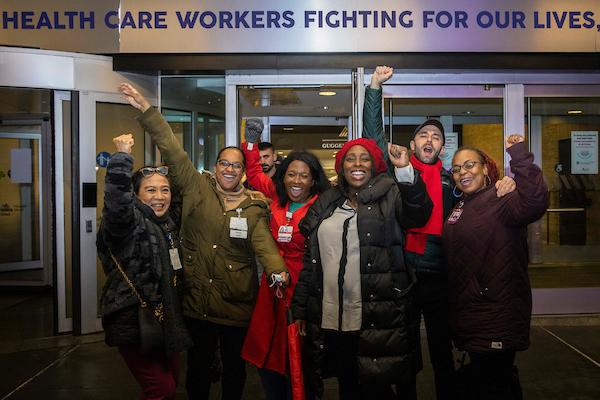Mount Sinai Hospital and Montefiore Bronx Win Groundbreaking Safe Staffing

The three-day strike of more than 7,000 nurses at two NYC hospitals—Mount Sinai and Montefiore—in January 2023 ended with groundbreaking agreements on safe staffing. Both facilities improved upon existing staffing standards—in some areas exceeding California nurse-to-patient ratios. Both contracts have stronger, precedent-setting staffing enforcement mechanisms, including expedited arbitration of staffing disputes and a new approach of including financial penalties when employers fail to uphold contractual safe staffing standards.
This new contractual staffing language sets a high bar for other facilities in New York and will become enforceable under New York’s hospital staffing committee law. Highlights of the agreements are below:
Mount Sinai Hospital Staffing Ratios and Grids
Under the old contract and the state staffing law, Sinai refused to note staffing levels as a nurse-to-patient ratio, despite NYSNA’s insistence. The new contract updates the old grid with a brand-new nurse-to-patient ratio for all inpatient units.
- Every ratio in the new Mount Sinai grid meets or exceeds the California ratio law. Many other units that aren’t ratio based are still reflected in the grids and enforceable, including cath lab, radiology, dialysis, and clinics. All units not addressed in the grid will be discussed and agreed to during the life of the contract.
Mount Sinai Hospital Staffing Enforcement:
There will be a staffing committee with equal number of staff nurses and management to deal with all staffing matters.
- They can set new staffing levels as units change, open, or reduce.
- They monitor all vacancies, track hiring, create and initiate recruitment and retention programs.
- They will be the first line of decision-making when there are disputes.
Under the new contract, Mount Sinai Hospital must take action to address the unsafe staffing standards in the hospital, including providing NYSNA with weekly transparent staffing data and postings. They must provide breaks without violating the ratios.
- If management fails to safely staff a unit, violates or fails to post or fill a vacancy, NYSNA can file complaints that will be heard by the staffing committee within 10 days. If there is no resolution after 72 hours of that meeting, the dispute will be sent to an arbitrator for an expedited hearing
- The arbitrators will issue remedies, including financial penalties. For example, the arbitrators can charge Mount Sinai the missing nurse’s salary and disperse it among the staff who worked short.
Montefiore Bronx Staffing Ratios and Grids:
For many years, Montefiore has had ratios with some major holes and flaws. The new contract takes action to course correct, including new Emergency Department ratios for the first time, improved step-down, intermediate care, telemetry, med-surg ratios. The float pool has been greatly expanded and new staff will be added to labor and delivery and other key units.
Every ratio in the new Montefiore Bronx grid meets or exceeds the California ratio law.
Montefiore Bronx Staffing Enforcement:
There will be a staffing committee with an equal number of staff nurses and management to deal with all staffing matters. Under the new contract, Montefiore Bronx must share data on all relevant staffing metrics with NYSNA. APRNs and other nurses will now have their own staffing committee to work on their issues.
If management fails to safely staff a unit, violates or fails to post or fill a vacancy, NYSNA can file complaints that will be heard by the staffing committee.
- All disputes will be sent to an arbitrator for an expedited hearing. An arbitrator will make a final binding decision within one week of the hearing.
- Three arbitrators will provide monthly standing dates to allow for expedited hearings. This will ensure there are no delayed hearings.
- The remedial authority will include relief to impacted nurses and patients. For example, the arbitrators can charge Montefiore the missing nurse’s salary and disperse it among the staff who worked short. Arbitrators can also provide the affected patients with a 15% discount on their care.